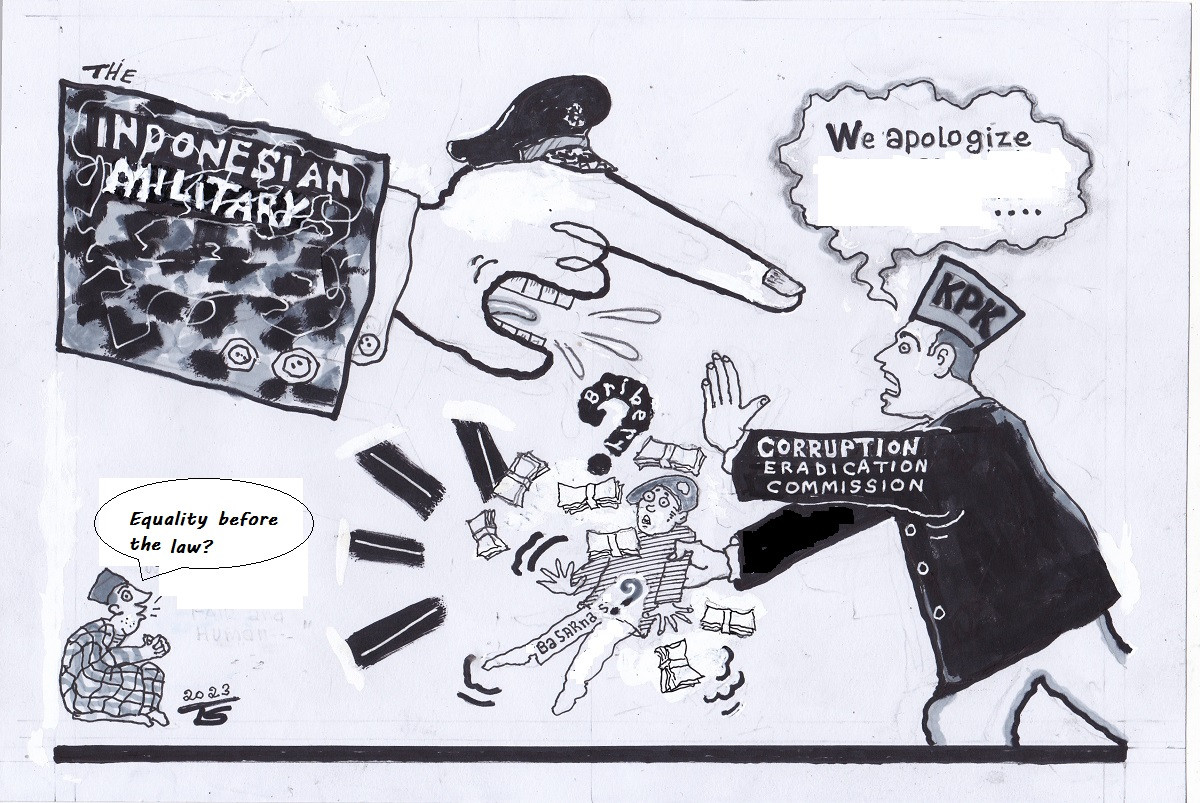Popular Reads
Top Results
Can't find what you're looking for?
View all search resultsPopular Reads
Top Results
Can't find what you're looking for?
View all search resultsSoldier on, KPK
All attempts to amend the 1997 Military Court Law since the beginning of the Reform Era have stalled because of TNI objections.
Change text size
Gift Premium Articles
to Anyone
U
nder its current leadership, the Corruption Eradication Commission (KPK) has been subject to its fair share of criticism, but still it deserves the public’s support when its efforts to enforce the law are met with resistance, even bullying, from a powerful institution.
The way we as a country deal with the tension between the KPK and the Indonesian Military (TNI), over the arrest of two active TNI officers in connection with alleged misappropriation of state funds at the National Search and Rescue Agency (Basarnas), will define the future of our fight against corruption.
As part of the sweeping reforms that brought Indonesia out of authoritarianism, the nation set an agenda of uprooting corruption, collusion and nepotism. These goals were institutionalized in the KPK. Since its inception in 2004, hundreds of public officials in the executive, legislative and judiciary, as well as businesspeople, have faced justice for graft. A few of them were police and military officers.
The reforms also put an end to the sociopolitical role of the military, requiring it to focus on defense alone. The new mandate was understandably painful for the TNI, given that the dwifungsi (dual roles) had allowed it to maintain outsize power for more than 30 years.
The TNI deserves credit for acceding to the reforms without excessive grumbling and generally respecting civilian supremacy. The progress, however, would have been smoother if the TNI had accepted proposed revisions to the 1997 Military Court Law that sought to allow district courts to hear criminal offenses involving active officers. All attempts to amend the law since the beginning of the Reform Era in 1998 have stalled because of TNI objections.
It is this 1997 law that has triggered the conflict between the KPK and the TNI. The antigraft agency justified its arrest of Basarnas chief Vice Air Marshal Henri Alfiandi and his aide-de-camp Lt. Col. Afri Budi Cahyanto with articles in the Corruption Law, while an irate TNI insisted that the Military Court Law took precedence. The KPK named the two officers suspects on July 26.
Then, on Friday, Military Police chief Rear Air Marshal Agung Handoko and a group of TNI officers, clad in military camouflage as if they were going to war, visited the KPK headquarters in Jakarta. Following the meeting, deputy KPK chief Johanis Tanak publicly apologized to the TNI.
On Monday, another deputy KPK chief, Nuruf Ghufron, said a number of KPK officials had received threats and been subject to intimidation. Deputy KPK chief Alexander Marwata, who announced the KPK’s decision to name the two Air Force officers suspects, received two flower bouquets from mysterious senders. One of the bouquets came with the message, “Congratulations, Pak Alexander Marwata, for successfully trespassing in the neighbor’s yard.”
This is not the first time the KPK has had to battle resistance from a state institution in its attempts to enforce the law. In October 2012, two companions of armed police officers, including members of the Densus 88 counterterrorism squad, besieged the KPK office in South Jakarta to capture KPK investigator Novel Baswedan after he summoned and questioned former National Traffic Police chief Insp. Gen. Djoko Susilo as a suspect.
The KPK and TNI have reached a compromise in the current case, but one that we fear will undermine the country’s anticorruption drive. The military will take over the investigation into Henri and Afri, while the KPK, the loser in the deal, will focus on investigating businessman Mulsunadi Gunawan, who allegedly gave a bribe of nearly Rp 1 billion (US$66,113) to Henri, with Afri serving as an intermediary.
In response to the controversy, President Joko “Jokowi” Widodo has promised to review the government policy that allows active TNI officers to fill civilian posts. The 2004 TNI Law permits this for only 10 positions, including Basarnas head, while requiring the officers in those jobs to comply with civilian norms.
The President’s initiative, though necessary, is not enough. For the sake of equality before the law and legal certainty, the Military Court Law must be revised now. The ambiguity it generates has hampered not only military reform but also the nation’s bid to uphold the rule of law.











